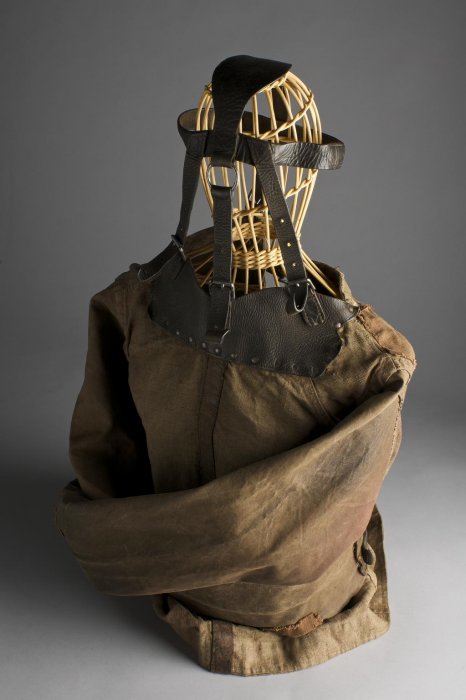Nzata, the Unwelcomed Hunger
Careful. This one's a biter.Nzata, or the 'Unwelcomed Hunger', is a psychological malady that instills two competing instincts in the afflicted: the overwhelming hunger for human flesh and the crippling fear of becoming a cannibal. They come to believe that nothing else can sate their gnawing hunger, though some are only stricken with an overwhelming preference for it.
Cause
It's a funny thing about hunger. Eventually, you get used to starving, and you get numb to it - but then you have that one bite to eat, and it all comes back.Nzata is believed to be contracted through the act of cannibalism, usually done in dire circumstances. Starvation, desperation, and salvation through the consumption of human flesh become inexorably linked, long after the victim has reached safety. Not all cannibals become afflicted with Nzata, but it is a cautionary tale for all.
Nzata is more frequent in parts of Araea where tales of cannibalistic terrors are common. Scholars debate whether it points to some foul legacy in the region or that the stories themselves are to blame.It isn't clear why some succumb and others don't. Common belief holds that those who eat their kin are more likely to become afflicted or that all flesh in the Far Deep become fouled. Others blame evil spirits, black sorcery, or tainted ancestry, depending on the region and the social status of the afflicted.
Symptom
You know, it's not really correct to say they want to eat flesh. It's usually the organs that go first.At the early stages of Nzata, the sick begin to suffer from a loss of appetite. Food becomes bland and unsatisfying, and does nothing to sate hunger. Soon, eating anything is followed by nausea and the creeping realization that the last time they felt any relief was in that triggering incident of cannibalism.
The afflicted start to worry that they will become ravenous cannibals and devour their friends and family. They eat less and less, while their cravings get more powerful - as does their fear. Many victims of Nzata become obsessed with memories of their first encounter with the taste of human flesh.
Hunger can be a powerful motivator, overriding any bond of love or kinship.Left untreated, the sick either die of starvation or finally succumb and attempt to eat another human, usually with tragic results. Doctors who treat Nzata have learned to use sturdy restraints.
Treatment
I'd keep the restraints tight if I were you.There are few effective treatments for Nzata. Curative tonics, exorcism, or even force-feeding of a proper diet are the most common treatments; others leave the restraints on until the afflicted have either recovered or perished. Broken minds are difficult to mend, and in most cases, it is instead treated as an illness of the body. Some sufferers do get better with time, as long as they can be prevented from wasting away. A few recover entirely on their own or with the support of their family and friends, but such cases are rare.
Exorcism is one of the more commonly successful treatments. The dramatic theater of 'driving the spirit of hunger' from the sick gives them a chance to believe that they have cured. If the belief becomes as strong as the delusion, they recover. Ineffective treatments are plentiful, with most having at best no or little effect. At worst, they only reinforce the afflicted's phantasms in their state. The more they are treated as a cannibal and a monster, the deeper it settled in their mind.
Ngata, the Accepted Hunger Nzata has a sister condition called Ngata, the Accepted Hunger. Nzata and Ngata can transition into one another in ways not yet understood, perhaps relying on some external validation or condemnation. Sufferers of Ngata shed their delusion that they can only gain nourishment from humans, but lose none of their preference for dining on them. In many, this craving only grows stronger. Those who suffer Ngata are still in control of themselves. They do not usually become murderous cannibals, and many go on to live relatively normal lives - but the craving, the hunger is always there. The temptation to indulge gnaws at the Ngata-suffering mind and grows stronger each time given into.
Medicine in Araea There are two dominant theories of medicine in Araea: the Atma and the Deva. The Atma believe that all illness comes from within, born of imbalance and can be cured by correcting that, while the Deva view the body as an intricate machine of flesh, blood, bile, and bone. With life or death on the line, the contest between the two schools is a festering wound that rarely benefits the patients.
Diagnosis
It can be difficult to tell when someone is suffering from Nzata. Even when identified, superstitious folk are just as likely to attribute it to some terrible sin the sufferer has committed or the depredation of evil spirits. Such accusations rarely end well for the sick. Most do not speak of the terrible cravings they experience, so their loved ones can only watch as they waste away unless the condition can be discovered. If they do speak, the Nzata is readily identified as the malady, but shame and fear mean that many carry this secret to their graves.
by ~unded
Although cannibalism is typically tolerated as something that happens from time to time, many who suffer from Nzata still burn with guilt. Even if society forgives them, they never do.
The Atma on Nzata
The Medikari believe Nzata to be the result of consuming tainted, unhealthy matter, and the festering imbalance that follows. They recognize the disease to be warping the mind but believe it is due to physical phenomenon. Atma treatments include diet and balance-restoring immersions, such as ice baths or steaming in springs. Both can be fatal for a body weakened by hunger and should be administered carefully. Read more about Atma - the Science of the Balanced BodyThose who cannot afford doctors' fees are usually treated by well-meaning but ignorant family or friends. An equal number are banished from their homes after one too many incidents or bites and end their days in wretched squalor.









How common is this? It's spoken os as though it's frequent but I'd imagine cannibalism isn't that comon... is it? I do see how animals and insects are often blamed—has anyone ever purposefully tainted a town's meat with Nzata? It's really interesting that they differentiate Ngata and Nzata, even though the difference between the two is merely acceptance, it suggests a very philosophical approach to their diseases which I like! A very nicely written, not-so-nice disorder that you've done a good job of bringing to life!
Cause > Para 1 > Sen 2: Should be performed.
Not terribly common, same as with cannibalism. And no, not really. Tainted meat is just another excuse: the disease resides almost entirely in the mind. :) Yep: Nzata comes from thinking you are a cannibal but really not wanting to be. Some people just go with it. :D
Creator of Araea, Megacorpolis, and many others.